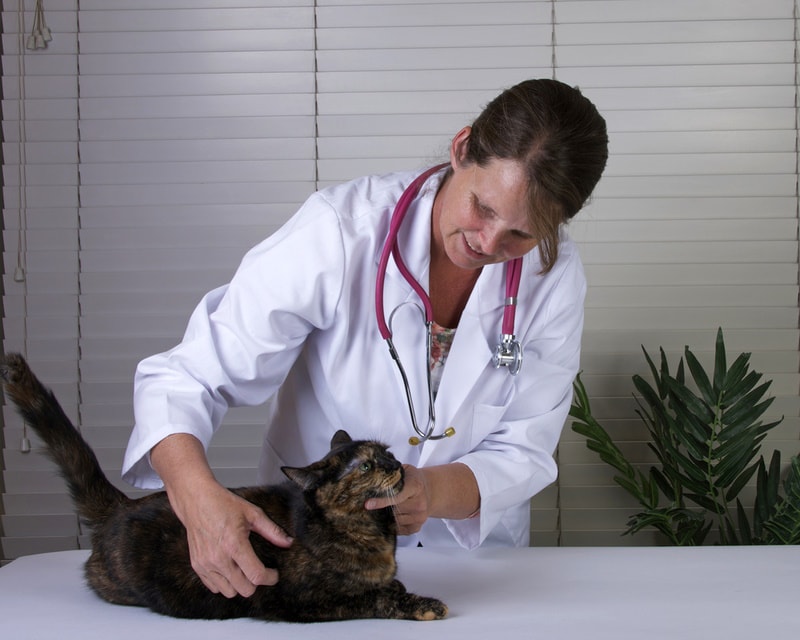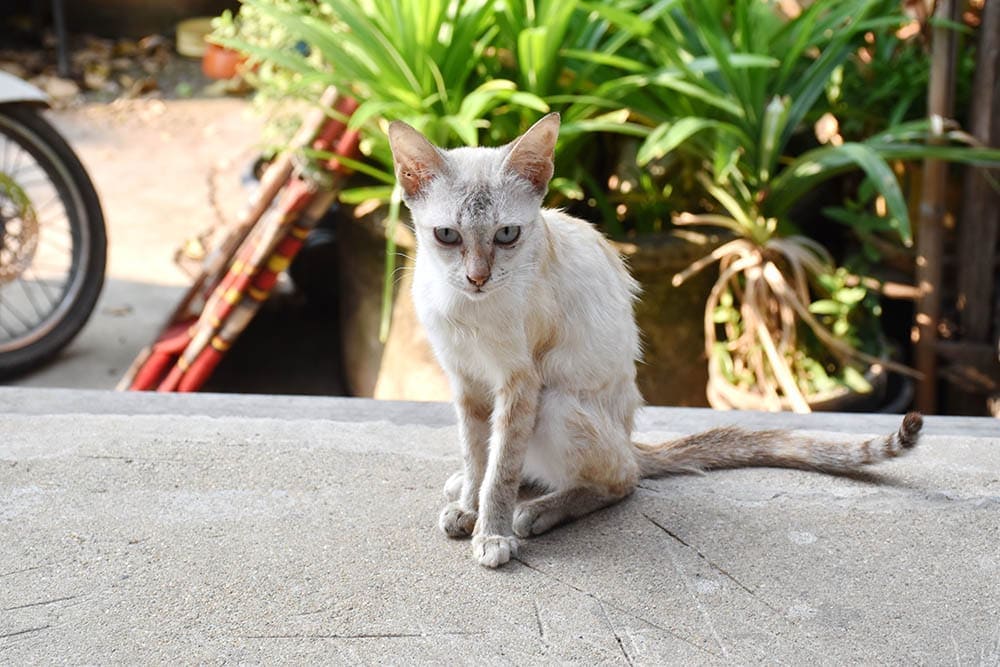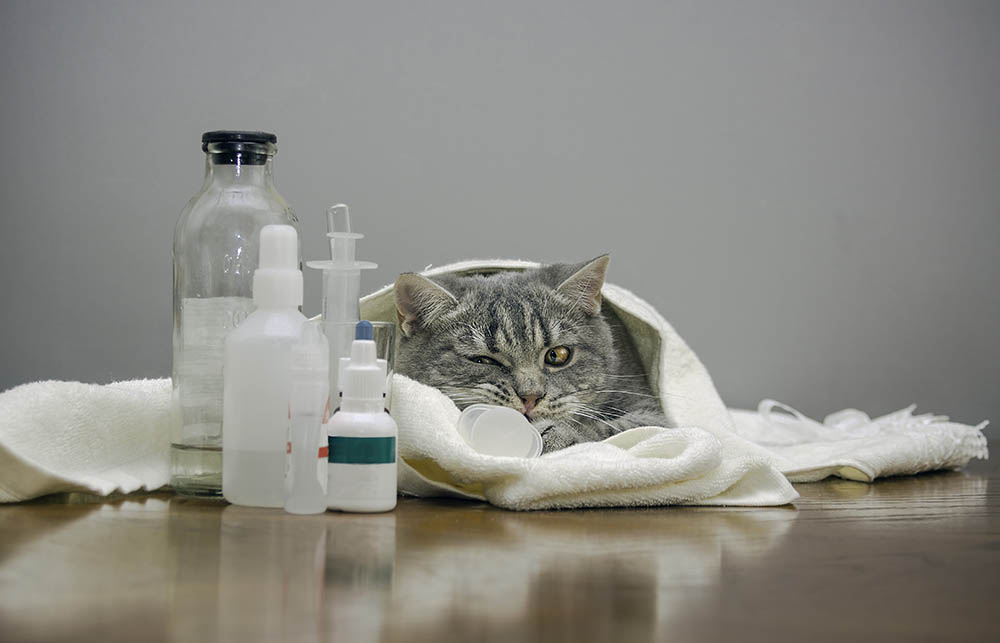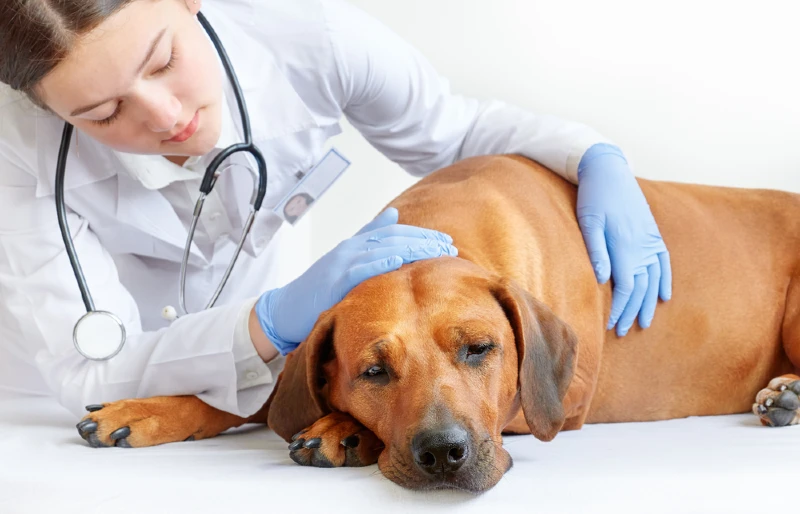Lymphadenopathy in Cats: Causes, Signs & Care (Vet Answer)
By Dr. Kim Podlecki, DVM (Vet)
Updated on

What Is Lymphadenopathy?
Lymphadenopathy, or enlarged lymph nodes, can occur for a number of reasons. In cats, the lymph nodes can become enlarged—most commonly, from bacterial infection(s), viral infection(s), intestinal inflammation, and cancer.
There are lymph nodes throughout the entire body. While some can be felt externally on physical exam, others are internal and cannot be felt.
What Are Lymph Nodes? And Where Are They Found?
Lymph nodes are small, soft, ovoid-shaped pieces of tissue found in the body within the lymphatic system. The lymphatic system is a network of lymph nodes and tracts meant to rid the body of toxins, waste, bacteria, and viruses. The system carries lymph fluid throughout the body, which contains white blood cells and inflammatory cells of the body, meant to help fight disease and infection.
Lymph nodes are found throughout the body. Trained veterinarians can often find the nodes along the jaw, in front of the shoulders, under the armpits, within the groin, and along the back of the leg. The lymphatic system and lymph nodes are also found within the chest and abdomen. The lymph nodes in the chest cannot be palpated due to the protection of the ribs. The nodes within the abdomen can be palpated only when greatly enlarged, especially in thin cats. If the abdominal nodes are only mildly enlarged, or your cat is overweight, your veterinarian will likely be unable to feel anything abnormal on an exam.

The 4 Most Common Causes of Lymphadenopathy
1. Cancer
Causes: Lymphoma is the most common cancer that can cause enlarged lymph nodes in cats. Lymphoma is a type of cancer that literally invades the lymph nodes, causing them to become enlarged. The lymph nodes that you can feel can become enlarged, in addition to lymph nodes within the cat’s abdomen. Lymphoma of the GI tract is very common, representing 74% of all feline intestinal tumors. In these cases, the lymph nodes near the intestines become enlarged, leaving owners and veterinarians unaware without advanced testing.
Lymph nodes can also become enlarged from other types of cancer. If there is a tumor anywhere in/on the cat’s body, the tumor can metastasize or spread to the nearby lymph nodes, causing them to become enlarged.
Signs: Signs vary greatly depending on the type of cancer. Oftentimes, cats and dogs with lymphoma will still act completely normal, despite their lymph nodes being greatly enlarged. Other times, your cat may become very lethargic, have a decreased appetite or stop eating altogether, develop vomiting, diarrhea, and excessive drinking.
As discussed above, you may or may not feel large lymph nodes on your cat. If your veterinarian is suspicious of cancer, they may likely recommend an abdominal ultrasound be performed. This is a great, non-invasive diagnostic tool to potentially see enlarged lymph nodes within the abdomen that can’t be palpated on physical exam.
Care: Again, this will greatly depend on the type of cancer your cat has. There are great chemotherapy protocols for lymphoma in animals today. Some of these medications may be available through your regular veterinarian, while some have to be given by a Board Certified Veterinary Oncologist.
If there is a primary tumor and the lymph nodes are enlarged from metastasis, your veterinarian may recommend surgical removal of the main tumor. Still, some cats become so sick from cancer that you, as an owner, may choose not to pursue any aggressive care, and just keep your cat comfortable. In these cases, your veterinarian will often prescribe steroids, anti-nausea medications, and potentially pain medications for supportive hospice care.

2. Bacterial Infection
Causes: As veterinarians, one of the most common conditions we will see in cats is dental disease. This can range from simply gingivitis with mild tartar to dental disease so advanced that the bone of the jaw becomes brittle. Other times, we can see infections within the tooth’s root. With this, there is significant bacterial infection involving the affected teeth. When this occurs, the surrounding lymph nodes, most frequently the ones along the jawline and near the shoulders/neck, can become enlarged. This is because the lymph nodes are working overtime to drain the infected space.
Dental disease is not the only bacterial infection that can cause enlarged lymph nodes. If your cat has an abscess (pocket of infection) from a bite or other injury, an infection on their skin, or anywhere in their body, the nearby lymph nodes can become enlarged just as described above.
Signs: Enlarged nodes near the infected area of the body. If the mouth/teeth are involved, you may notice an odor or even discharge from your cat’s mouth. Your cat may not want to eat, may drop food, turn their head to the side when attempting to eat, or paw at their mouth in pain.
Care: Antibiotics are the mainstay of treatment for bacterial infections. Depending where in/on the body your cat’s infection is, your veterinarian will choose an appropriate antibiotic. Pain medications and/or anti-inflammatories are often described as well. If there is an infected tooth and/or serious dental disease present, your veterinarian will likely recommend a dental with tooth extractions.

3. Viral Infection
Causes: Most cat owners have heard the terms, FIV, FeLV and FIP at some point in their lives. However, you may or may not know what these are. FIV (Feline Immunodeficiency Virus), FeLV (Feline Leukemia Virus) and FIP (Feline Infectious Peritonitis) are all viral diseases that are contagious amongst cats. These diseases are most commonly seen in outdoor-only cats, indoor/outdoor cats, or cats who were previously stray and are now kept inside.
While the exact mechanism of infection varies slightly amongst the diseases, in general, these diseases can be spread from cat to cat through blood, bites, and infected body secretions, such as saliva. For instance, FIP is a virus transmitted from one cat to another; however, the virus itself is not infectious. If that specific virus mutates within a specific cat, that’s when we see disease develop.
Signs: Some cats can just be carriers of the above diseases and never develop clinically significant disease. Still, others can develop severe lethargy, weakness, critically low red blood cell and white blood cell counts, seizures, kidney failure, fluid build-up within body cavities, and weight loss. Lymph nodes can become enlarged anywhere on the body, most commonly within the abdomen, as they react to the viruses in the cat’s body.
Care: Unfortunately, there are no cures for any of the above viruses. Once your cat has one, they will have it for life. While there are vaccines to help prevent disease, your cat may have already been exposed and/or carrying the disease prior to you adopting them. Depending on how sick your cat is, your veterinarian will be able to walk you through supportive care, hospice care, and other potential treatment options.

4. Inflammatory Bowel Disease (IBD)
Causes: Inflammation of the intestinal tract is not something we can see with the naked eye. An ultrasound or other advanced imaging will be able to visualize thickened intestines, often in addition to enlarged lymph nodes of the GI tract. The exact cause is unknown but thought to be an immune-mediated disease.
Signs: Because the lymph nodes near the intestinal tract are within the abdomen, oftentimes, a veterinarian will be unable to feel these abnormalities, sometimes depending on how thin your cat is. Your cat may have vomiting and/or diarrhea—some cats become anorexic or have a decreased appetite and weight loss. It can be very challenging to distinguish between IBD and Lymphoma of the intestines, in which case advanced testing is often needed.
Care: Steroids, and what are called immune-suppressive medications, are the main treatments for IBD. Your veterinarian may also want to put your cat on a special prescription diet. These medications are most commonly given as oral medications at home, though some cats may be treated with injections in the hospital. Once treatment is started, your cat will be on medications for the rest of their life. The hope is to get your cat to the lowest effective dose of medications, but often these medications can never be stopped completely.
Conclusion
Lymphadenopathy, or enlarged lymph nodes, can occur for a number of reasons in cats. Some causes are completely treatable and curable, such as bacterial infection or abscess. Other causes, such as the viruses FeLV and FIV, cannot be cured. Your cat may be able to receive treatment to help keep them comfortable, and while the lymph nodes may become smaller, they may have that disease for their entire life.
If you feel enlarged lymph nodes on your cat, or you notice they are not acting like themselves, seek a veterinary consultation as soon as possible.
See Also:
Featured Image Credit: Irina Vasilevskaia, Shutterstock














